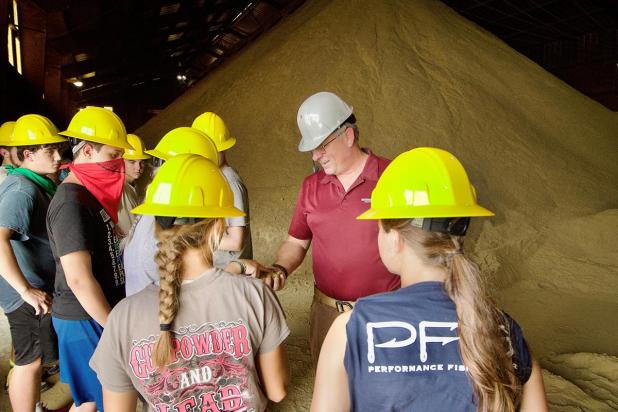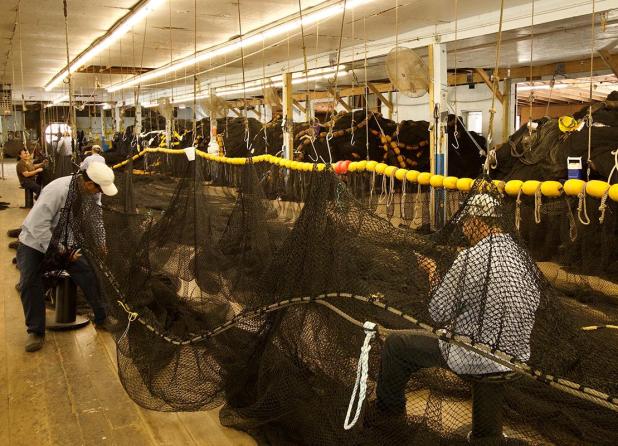
Photo by V. Todd Miller/LSU AgCenter
Omega Protein General Manager Steve Williams and 4-H campers stand in front a mountain of menhaden meal, which can be used as aquaculture feed or dietary supplements during a tour of the processing plant at Marsh Maneuvers. The annual July camp teaches Louisiana students about the importance of marsh and coastal environments.

Photo by V. Todd Miller/LSU AgCenter
Workers mend fishing nets at Omega Protein, where 4-H’ers learned about the uses of menhaden, or pogy, at Marsh Maneuvers, an annual July camp that teaches Louisiana students about the importance of marsh and coastal environments.
Something fishy going on at 4-H Marsh Maneuvers
“It’s like a cross between dog food and burnt pizza,” said one attendee of the smell permeating the hot July air at Omega Protein, a sustainable menhaden processing plant near Abbeville.
He was part of a group of 4-H youths participating in Marsh Maneuvers.
For more than 30 years, LSU AgCenter and Louisiana Sea Grant coastal specialist Mark Shirley has been leading the five-day camp, which teaches Louisiana students about the importance of marsh and coastal environments. It’s split into four-week groupings every July.
“Inside a classroom, you don’t get a chance to see or appreciate the resources we have here in costal Louisiana,” Shirley said. “Walking through the marsh grass, getting in the water or doing a coastal restoration project shows students who may be seeking a career that there’s a lot to offer here.”
Menhaden, also called pogy, is sometimes called the most important fish in the world because of its use in producing such things as aquaculture feeds and dietary supplements due to its rich omega-3 fat content.
Omega Protein general manager Steve Williams said his facility processes approximately 400 million fish a year with a focus on sustainability.
“Although we’re a niche industry, I think we have a lot to offer the students on how a business operates,” Williams said. “For example, for us, wastewater treatment for our company is just as important as catching fish.”
After the plant tour, the 4-H’ers traveled back to basecamp for lunch and to learn about the uses and economics of alligator hide from Casey Stannard, LSU College of Agriculture associate professor of apparel design. As part of a grant supported by Louisiana Sea Grant, the campers crafted their own personal gator hide key chains.
“We’re looking at new markets for wild and farm-raised alligator leather,” Stannard said. “So we wanted to show the students the uses of the leather and teach them all the things we can do with it.”
Emma Corpier, a camper from Vernon Parish whose favorite aspect of Marsh Maneuvers was an airboat ride, said she learned a great deal over the course of her five days, including how to skin an alligator.
“I’ve learned more about the wetlands and how to become a better environmentalist,” the sophomore said. “I think it’s one of the best experiences in 4-H.”
For his part, Shirley said the best part about Marsh Maneuvers is witnessing what he calls the “lightbulb moment” for the 4-H’ers when they see all the opportunities available to them after graduation.
“I’ve followed some of these kids as they’ve grown up. Some have gone on to receive advanced degrees in marine science, wildlife management and other natural resources fields. Some now work for Louisiana state agencies involved with coastal restoration, a few are working for federal agencies like NOAA, and some are working for groups like Ducks Unlimited,” he said. “The majority are doing other things, but they still have a great appreciation for our coastal resources and see the value of maintaining Louisiana’s coastal wetlands.”
